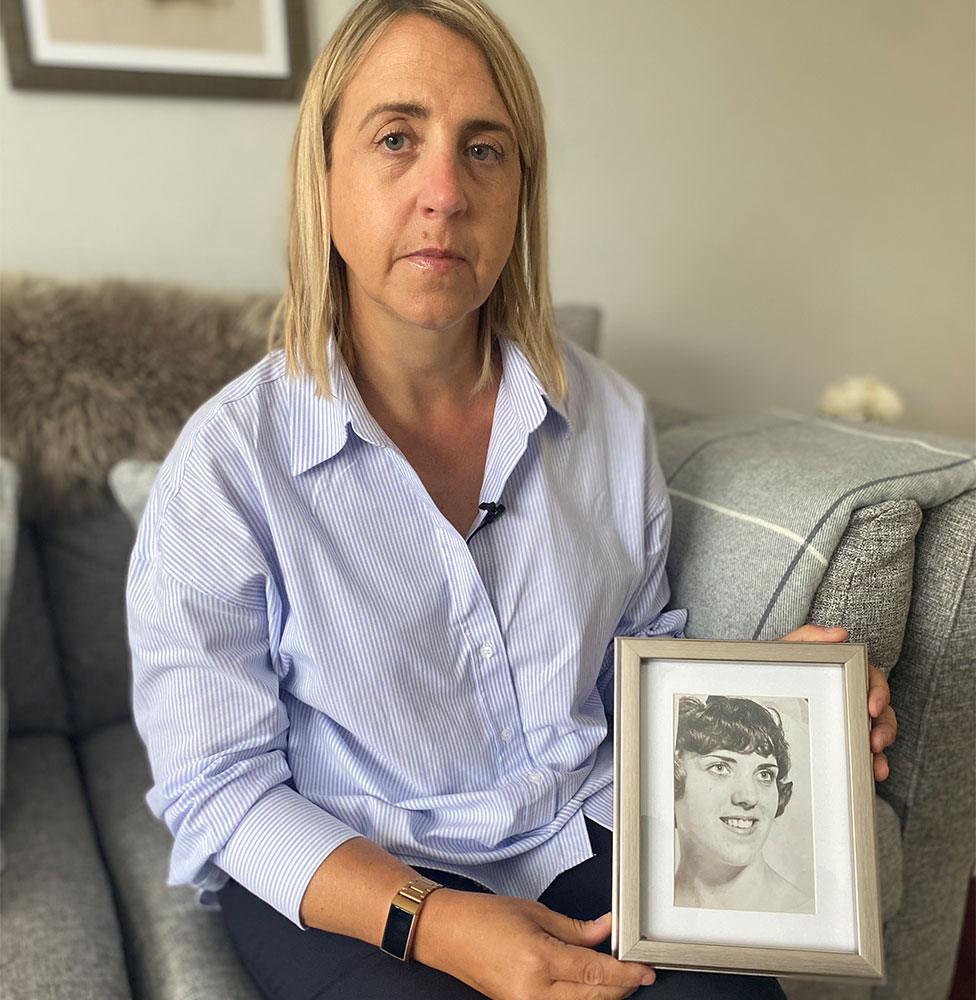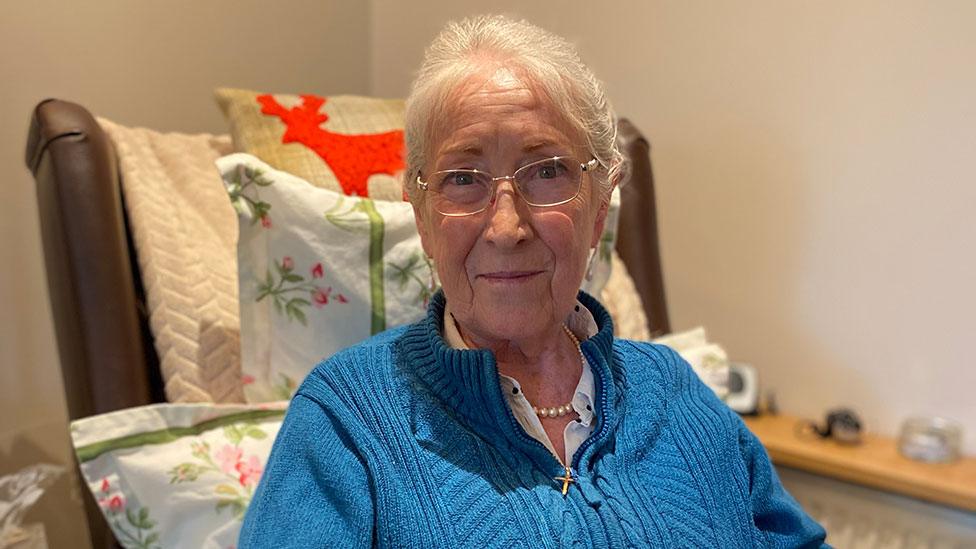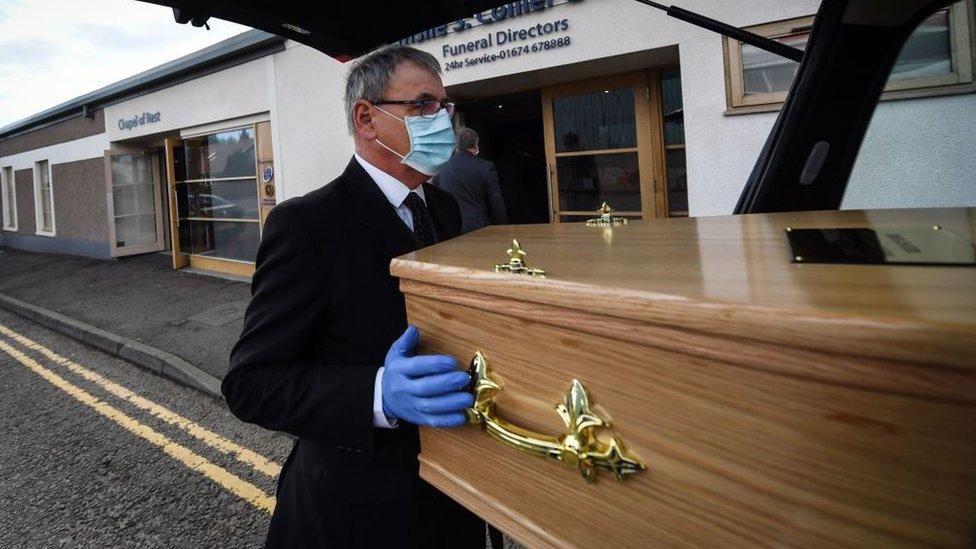A good death? Rise in number of Scots dying at home during pandemic
- Published
With the support of family and cancer charity Marie Curie, Mary Hughes decided to die at home.
Scotland has recorded a 41% rise in deaths in the community since the start of the Covid pandemic, according to official statistics.
Since March 2020, 26,730 people have died at home or outside a hospital or care setting - an increase of 7,826 on the five-year average.
Cancer accounted for more than a third (2,994) of those excess deaths.
Charities are calling for more support for people dying at home, and a new national strategy for palliative care.
Richard Meade, head of policy at end of life charity Marie Curie, said: "What we are hearing, and what a recent survey found, was that three quarters of carers looking after someone with a terminal illness struggled to get the care and support they needed.
"If we are continuing to see this trend of people dying at home, then we need to make sure they are getting the help and support that they need.
"Over the next 20 years, we are going to be seeing increasing numbers of people dying with palliative care needs. It is part of our ageing population."
National Records for Scotland statistics show that 1,850 excess deaths in the community were caused by circulatory conditions such as heart disease and stroke.
Only 518 deaths outside hospitals or care homes were a result of Covid.
'I spent my mum's final weeks fighting for her care at home'


Anne Currie, 76, died at home from Motor Neurone Disease (MND) last August, just months after the sudden death of her husband Jim.
In her final weeks, she had been treated at hospital for an infection and had been due to return home. However, her family and Inverclyde Council's social work department felt her care package - with four visits a day - was inadequate.
Her daughter Helen Orr, 53, says Anne spent four weeks in a surgical ward as the council tried to organise 24-hour care for her.
It seemed the only option available for Anne was a care home, which was against her wish to die in her own home.
She told BBC Scotland's The Nine: "The time that I could have and should have spent with her was very much shortened by the fact I had to negotiate and find something to support that everyone would be happy with, including her."
Eventually, after intervention from charity MND Scotland, Anne was provided with a 24-hour care package and she returned home. However, she did not regain consciousness after leaving hospital and died a week later.
Helen said: "Four weeks is not a long time. But when you are constantly fighting for something, four weeks is a lifetime. And it was my mum's lifetime.
"Did she know that she was home? That's not OK. She should have been aware she was home and her wishes should have been granted a lot sooner."
Susan Webster, of MND Scotland, said: "Stories like Anne's are not uncommon, and some people never receive the care they need in time.
"Our advocacy team is here to help people living with MND when the system fails, but it shouldn't be this way. Families should be able to spend quality time with their loved ones, not fighting the system or worrying that the care put in place isn't adequate."
A spokesman for Inverclyde Health and Social Care Partnership (HSCP) said it has a four-week target to set up support packages.
He continued: "The HSCP had agreed to look at this level of support prior to contact from MND Scotland and were completing assessment and identifying potential supports.
"The HSCP does not retain a pool of staff to draw on in these situations and the more extensive support requirements can take time to establish a care package that covers 24 hours especially during the pandemic."
'I started to get anxious about end of life'

Retired customs officer Mary Hughes, 78, suffers from bone cancer. When she was diagnosed in February 2020, she was told she could only expect to live a further two years.
She has been arranging her own death at home with the help of Marie Curie
The great-grandmother told The Nine: "When I took ill, I started to get anxious about end of life. How would my family feel? Would they object to me dying in hospital or would they rather be with me at home?
"There were tears every day. Would I be alone? Would I be sad or frightened?"
She continued: "After I discussed it with my husband and children, and Marie Curie, I feel far more relaxed now. I'm happy that I am going to have my family around me. Nothing bad is going to happen to me.
"I won't be afraid to go because I will know that my family is happy and I am happy."
'The support they need isn't available'
'Keen to avoid hospital'
Mark Hazelwood, of the Scottish Partnership for Palliative Care, said there had been a small increase in people dying at home before the pandemic due to improved support.
However, he said the recent rise is likely down to people "keen to avoid going to hospital where visits by family were very limited and where there was also a risk of Covid-19 infection".
He continued: "In other cases people aren't able to die at home because the support they need isn't available.
"This needs to be addressed by: adequate resourcing of GPs, district nurses and social care workers who are the backbone of services in the community.
"In turn these services need 24/7 access to advice and support from palliative care specialists and ready availability of medicines needed to keep people comfortable towards the end of life."
A Scottish government spokesperson said: "We've seen an increase in the number of people who have died at home from cancer alongside a decrease in that number in hospitals and care homes.
"With Public Health Scotland and the National Records of Scotland, we are engaged in a programme of research to better understand the wider impact of Covid-19 on Scotland's population."
The government said it plans to produce a new strategy for end-of-life and palliative care during this parliamentary term.
Related topics
- Published20 January 2021
